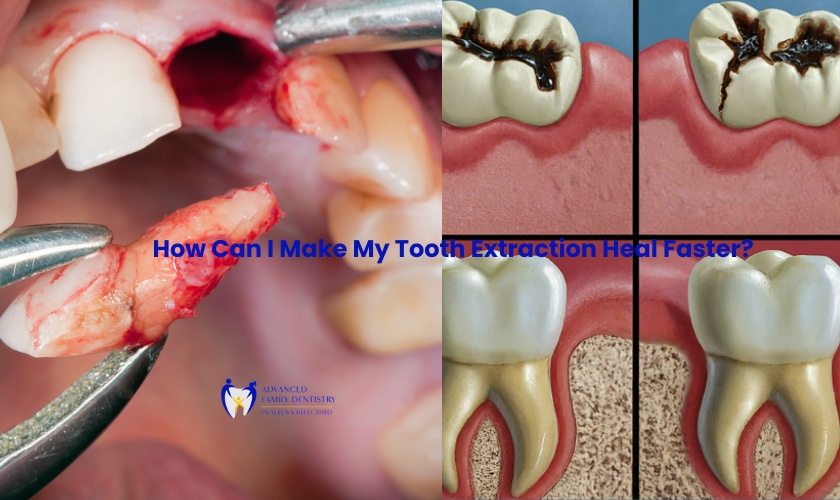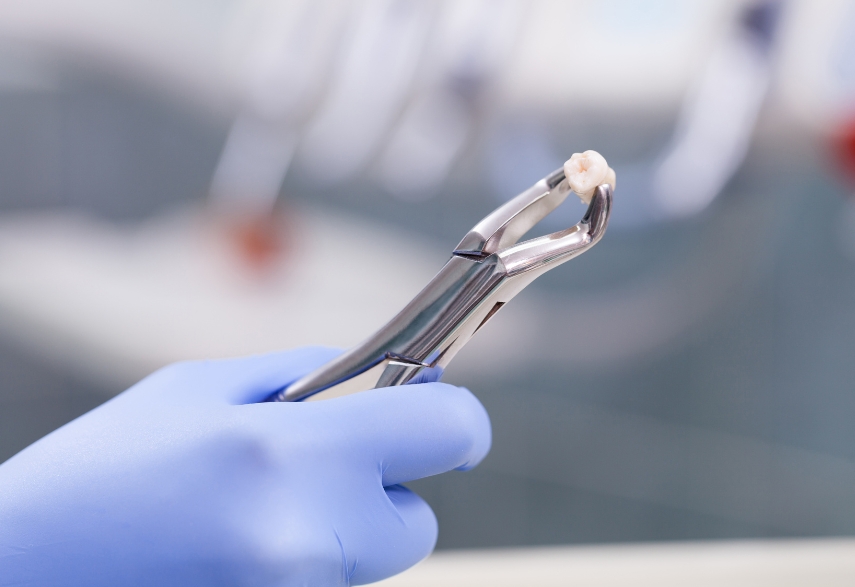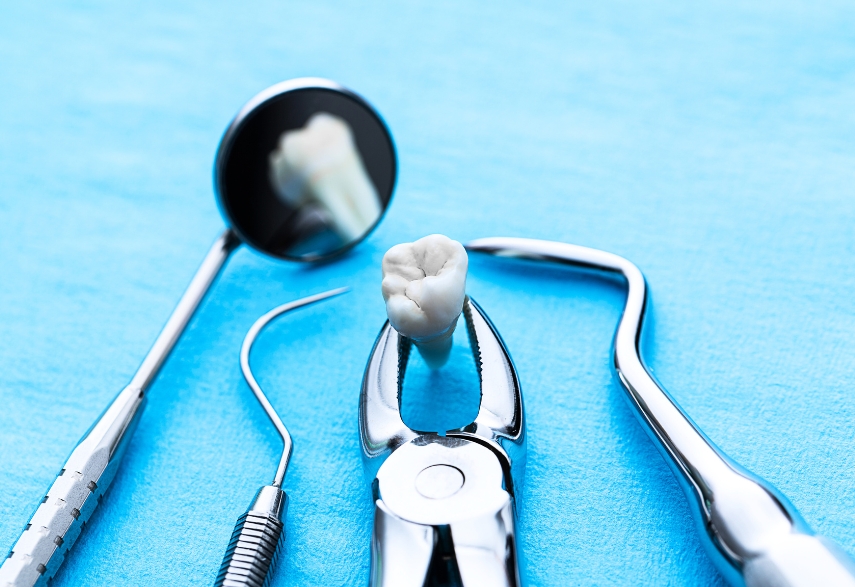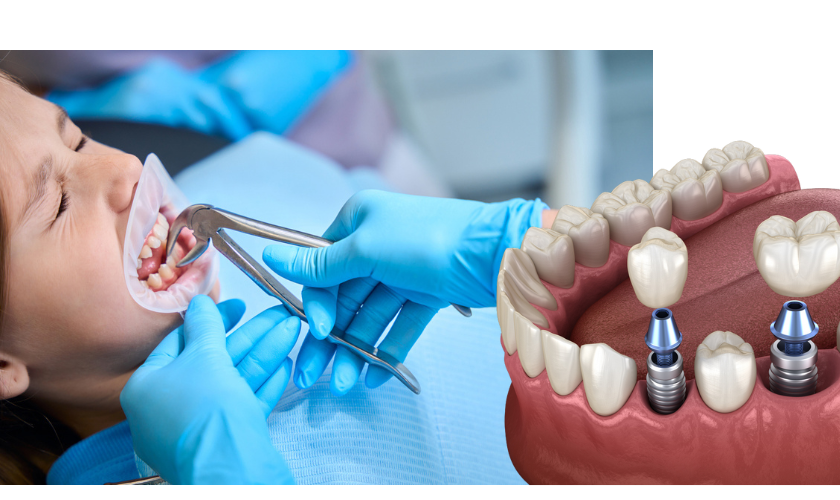Top Family, Cosmetic and Implant Center In 537 Amherst St, Nashua, NH 03063
How Can I Make My Tooth Extraction Heal Faster?

Tooth extraction can be an intimidating experience, whether it’s due to tooth decay, crowding, or other dental issues. Post-extraction care is crucial to ensure a smooth and quick recovery. In this comprehensive guide, we’ll explore effective strategies to expedite the healing process, dietary recommendations, and essential tips to manage your recovery. By following these guidelines, you can minimize discomfort and avoid complications, allowing you to return to your daily routine sooner.
How can I speed up the healing process after tooth extraction?
Following a tooth extraction, your body initiates a remarkable healing process to mend the extraction site and restore oral health. While this process is natural, there are steps you can take to promote faster healing and minimize discomfort:
- Minimize Swelling: Swelling is a common side effect after a tooth extraction. To reduce swelling, apply an ice pack wrapped in a thin cloth to your cheek near the extraction site for 15-minute intervals, several times a day, during the first 24-48 hours.
- Pain Management: Your dentist will likely prescribe pain medication to manage post-extraction discomfort. Take these medications exactly as prescribed to ensure effective pain relief.
- Rest and Relaxation: Your body needs time and energy to heal. Take a break from strenuous activities and prioritize rest in the first few days following your extraction.
- Maintain Gentle Oral Hygiene: Maintaining good oral hygiene is crucial for preventing infection and promoting healing. Gently brush your teeth, avoiding the extraction site, with a soft-bristled toothbrush. You can also begin using a warm salt water rinse (one teaspoon of table salt dissolved in a glass of warm water) 2-3 days after surgery, following your dentist’s specific instructions.
- Dietary Modifications: Stick to a soft diet for the first few days after your extraction. Opt for easily chewable foods like mashed potatoes, yogurt, applesauce, and soups. Avoid hard, crunchy, spicy, or acidic foods that can irritate the extraction site and hinder healing.
- Avoid Smoking and Alcohol: Smoking and alcohol consumption can significantly impede healing and increase the risk of infection. It’s best to avoid both for at least a week after your extraction.
- Minimize Straw Use: Suction from straws can dislodge the blood clot that forms at the extraction site, potentially delaying healing. Opt for sips directly from a glass or cup instead.
What promotes tooth extraction healing?
Keeping your mouth clean is vital to prevent infection and promote healing. Brush your teeth gently, avoiding the extraction site, and continue using the saltwater rinse to keep the area clean.
1. Healthy Diet
Nutrient-rich foods can boost your body’s healing capabilities. Incorporate foods high in vitamins A and C, calcium, and protein to support tissue repair and immune function.
2. Avoiding Tobacco and Alcohol
Tobacco and alcohol can interfere with the healing process and increase the risk of complications such as dry socket, an infection of the extraction site. Refrain from using these substances for at least 72 hours post-extraction.
3. Staying Hydrated
Adequate hydration helps maintain the body’s natural healing processes and reduces the risk of dry socket. Drink water frequently and avoid dehydrating beverages.
4. Monitoring for Complications
Keep an eye on your extraction site for signs of infection or other complications. Symptoms such as severe pain, prolonged bleeding, or pus should prompt a visit to your dentist.
How Long Does Hole Take to Close After Tooth Extraction?
The time it takes for the hole left by a tooth extraction to close varies depending on several factors, including the tooth’s location, the patient’s age, and overall health.
Healing Timeline
- First 24-48 hours: The blood clot forms, and the initial healing begins.
- 1 week: The soft tissue starts to close over the extraction site.
- 2 weeks: Significant healing of the gums occurs, with the site appearing less open.
- 3-4 weeks: The hole may be completely closed with soft tissue, but the underlying bone is still healing.
- 3-6 months: Complete bone healing can take several months, especially for larger teeth like molars.
Proper care and following your dentist’s instructions can significantly speed up this process.
What Foods You Can Eat After Your Tooth Extraction
Eating the right foods post-extraction can help avoid irritation and provide the necessary nutrients for healing. Here’s a list of foods that are generally safe and beneficial after a tooth extraction:
1. Soft Foods
- Mashed Potatoes: Easy to eat and can be fortified with additional nutrients.
- Yogurt: Smooth texture and contains probiotics that promote overall health.
- Applesauce: Gentle on the mouth and provides vitamins and fiber.
- Scrambled Eggs: Soft, high in protein, and easy to chew.
- Smoothies: Blended fruits and vegetables can provide a nutrient boost without needing to chew.
2. Hydrating Liquids
- Water: Essential for hydration and promoting healing.
- Broth: Provides nutrients and hydration without needing to chew.
- Herbal Teas: Can soothe the mouth and provide additional hydration.
3. Foods to Avoid
- Crunchy or Hard Foods: Such as chips and nuts, which can irritate or damage the extraction site.
- Spicy Foods: Can cause irritation and discomfort.
- Acidic Foods and Drinks: Such as citrus fruits and sodas, which can irritate the extraction site.
- Hot Foods and Beverages: Can dissolve the blood clot and delay healing.
Do You Need a Tooth Extraction in Nashua?
If you’re facing a tooth extraction in Nashua, our qualified dental practice Advanced Family Dentistry Nashua is available to provide compassionate care and ensure a smooth recovery journey. Don’t hesitate to schedule an appointment and discuss your concerns with a dentist. With proper care and diligence, you can ensure a comfortable and speedy post-extraction recovery.




